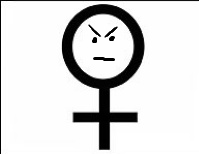Content note: This post discusses emotional abuse
In the latest in a string of policies which sound good and are incredibly cheap to implement, Theresa May will announce plans to put emotional abuse on a par with physical domestic violence. This sounds like nothing to object to, a long-awaited recognition of the seriousness of the coercive dynamics which so often sustain abusive relationships and hit survivors hard.
There is a catch, though, and it’s a catch which means I severely doubt that any perpetrators will find themselves prosecuted for something they have blatantly done: the whole thing hinges on telling the police.
The way the police tend to work is through talking about what happened. You list specific incidents. This happened, and then this happened, and then that happened. Imagine having to do this as a survivor of emotional abuse!
The very clever thing about emotional abuse, the thing that really helps abusers keep things going is how petty it sounds if you recount a blow-by-blow history of what happened to you. I’ve never gone into detail about what I experienced in an emotionally abusive relationship, because under the flicker of gaslight, it all sounds rather ridiculous. I could tell you all about some drama involving a duvet or how I needed to watch what my face was doing during sex, but to be quite honest, I’m embarrassed to speak about these things, because everything would require so much detailed explanation of the entire context, and when boiled down to a story it still all sounds quite trivial.
Emotional abuse is a pattern which is hard to explain, and reinforced by abusers making you feel like everything is silly and you’re overreacting.
I wouldn’t explain what happened to me in an incident-specific format to a friend. Hell, it took a lot of time for me to open up about these things to a therapist because they sounded so probably-nothing to me. So why the fuck would I want to speak to a hostile police officer about all of this? The police are known to suck at talking to vulnerable women at the best of times, and this is a situation which is so intrinsically delicate that I cannot imagine any survivors wanting to take the leap and report to the cops. The effects and mechanisms of emotional abuse just present too much of a barrier to this happening.
What would actually help survivors of emotional abuse a lot more is one of the strongest weapons against abusers: knowledge for everyone. Emotional abuse is so little-understood, and that needs to change. An informed populace, with the level of knowledge about what emotional abuse is and the understanding that sometimes what sounds trivial and petty is anything but, could join forces with survivors against abusers. It would be so much easier to fight emotional abuse if we started from a position of supporting and believing survivors, knowing that what might sound like nothing is probably something, especially if she’s taken the step of speaking out.
It would all be so much easier if we could see the difference between little squabbles and emotional abuse, but the problem is that our culture normalises coercive control in relationships to the point that these things are indistinguishable to us. Survivors know the difference, and we should listen to them.
I don’t expect the government to get working on tackling emotional abuse in a way that would actually work, any more than they tackle other forms of violence against women. I have no faith in them; they’re not the route. So we must hack around them, supporting survivors in the way that they want us to.

“The very clever thing about emotional abuse, the thing that really helps abusers keep things going is how petty it sounds if you recount a blow-by-blow history of what happened to you.”
So true. Even being aware of coercive control as a concept, as “a thing that happens to other people” almost, I didn’t think my own experiences were “enough” to qualify – often, I still don’t. It’s always reassuring, if a little bit massively depressing, to know I’m not the only one that feels that way.
Reblogged this on Beechdey’s Weblog.
I feel it is most likely to be used by an abuser accusing a survivor with ‘mirror image’ abuse to ‘punish’ them for escape. I have observed several post-break-up ‘role-reversal’ accusations. You can’t assume the abuser is always the man, or that the accuser is always the victim, life tells me neither is a reliable guide to the complex realities.
Also, my ex was the master of “oh this incident is just a one time event, I’m not like this, don’t get so mad over this one little thing” A lot of times it was a little thing. But when you have hundreds of little things, they add up to a big problem. I call it ‘isolated incident syndrome’
Out of curiosity, what would you suggest would be the best way to go about criminalising emotional abuse without requiring the victim to give a detailed account to law enforcement in reporting the abuse? How do you prosecute an accused emotional abuser without having specific knowledge of what it is they are being accused of doing?
Another legal note: emotional abuse is already considered a form of abuse in the context of obtaining protective orders from the family courts, and in relation to children. In theory, anyway. In practice, as you can likely imagine or already know, it’s hard to convince the courts that protection is necessary without the more immediately obvious evidence of physical injuries or direct threats. Given that the standard of proof required for criminal liability is higher, I’m afraid to say I think it’s going to be pretty difficult to secure convictions under this legislation. Even so, of course it’s a step in the right direction… but without a broader change in social attitudes it won’t be very effective.